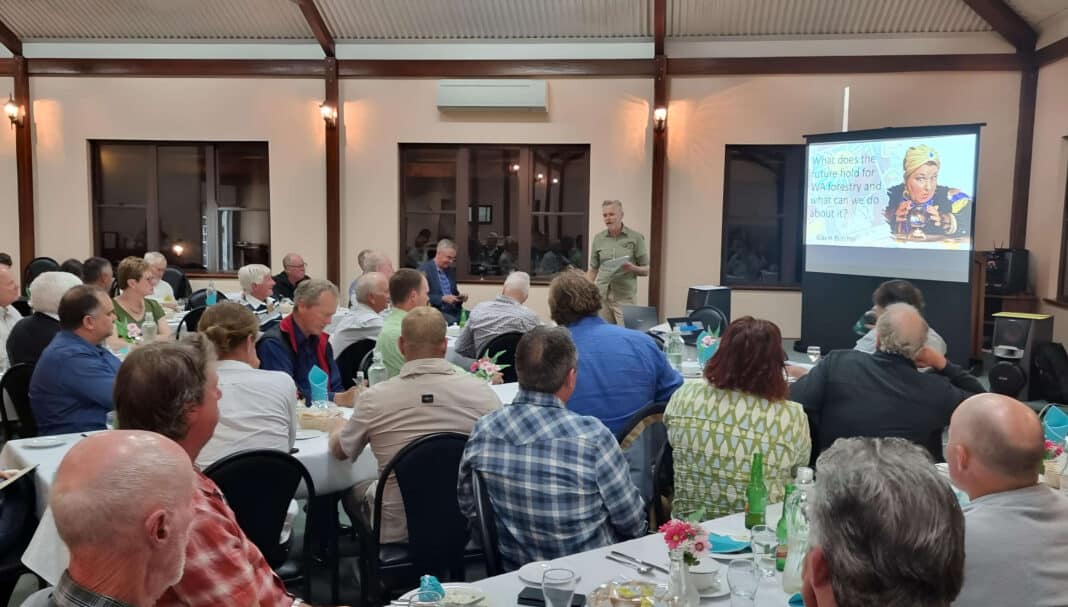The Western Australia timber industry is a captive of the state government’s monopoly in timber resources.
This was the opinion expressed on Tuesday by professional forester and industry analyst Gavin Butcher at an industry dinner at Dardanup in the state’s southwest, hosted by the Leschenault Timber Industry Club.
“As a monopolist, the state government can ignore the needs of business and operate in a high-handed manner,” Butcher said.
“While previous governments sought to promote and develop a local wood processing and manufacturing sector, the current government has turned its back on this proposal,” he said.
Butcher compared the performance of the current McGowan-Cook government with previous governments and found that it had overseen a contraction in the industry and failed to undertake any major policy development.
“This is bizarre,” Butcher said.
“We are in an era where sustainable resource use and the carbon economy are critical policy directions. The necessary energy to foster conditions for the timber industry to invest and grow is apparent from the achievements of previous governments, from Sir Charles Court onwards, and is in stark contrast to the lack of interest exhibited by the current government.”
“In the past, both Labor and Liberal governments have understood the important role the state can provide in the industry settings and have been effective in achieving a dynamic, integrated sector. This legacy is now being rundown by lack of attention to the role of government.”
Mr Butcher summarised key developments in the WA timber industry over the past five decades in a series of graphics:
| Government | Industry Achievements |
| Charles Court (1974-83) | State Agreements Wesfi General Working Plan Woodchip exports, Bunbury mill |
| Brian Burke (1983-93) | Integrated land management Timber strategy Sharefarming Simcoa Wespine |
| Richard Court (1993-2001) | Foreign investment in plantation expansion Albany woodchip mill |
| Geoff Gallop (2001- 08) | Wesbeam Value-adding investment security guarantees Whittakers small log line Carbon legislation |
| Colin Barnett (2008 -17) | Dutjahn Sandalwood processing Albany Pellet Plant |
| Mark McGowan (2017 -) |
Gavin Butcher presented a case for the timber industry to rely less on the government.
“The current government is not interested in promoting the sustainable timber processing and manufacturing industry,” he said.
“Even the investment in pine plantations only came after five years in government, and only when the federal government changed the rules and allowed carbon credits for these trees.
“There have been no steps taken to solve the ‘wood drought’ that is coming in the next five years/ The fact is they have made it worse.”
The audience, which included members of Parliament Steve Martin, Louise Kingston and Ben Dawkins, appreciated the frank assessment of the state of forestry in Western Australia.
Mr Butcher promoted steps to reduce the dependence on the government, including:
- Prepare an industry strategy.
- Spend the $350 million on private grower plantation grants rather than buying land.
- Decrease the regulations surrounding sustainable harvesting of private native forests.
- Include yields from ecological thinning in the forest management plan to allow investment in processing this wood and avoid major fire risks.
- Subsidise the thinning of unmanaged pine plantations to promote growth.
- Improve fire protection for existing plantations.
“The government needs to focus on a role of promoting the timber industry,” Butcher said.
“It would do this better if it closed down the Forest Products Commission as a commercial forestry agency and focused on policy settings for this most sustainable of industries.”






